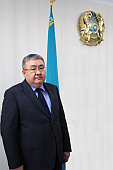Kazakhstan – Building a Fair and Impartial Judicial System Fit for the Modern Age
By Talgat Donakov
Published on May 27, 2019

The cornerstones of any prosperous, forward-looking nation are its democratic and civil institutions. An independent, highly specialized and impartial judicial system underpins all of this.
The administration of justice should never depend on external factors. For a judiciary to function successfully and effectively, judges must be free from outside influence, patronage, and politics.
To be a member of the judiciary is to take a common oath. It requires judges to fairly and honorably evaluate the merits of a legal case, based on available information and in line with domestic law.
The trusted status of a judge should only be bestowed on the highest caliber of people.
Only those with leading qualifications and an impeccable reputation can and should apply for the position of a judge. In Kazakhstan, the selection of candidates for judicial positions is a serious and complex process but one of national importance.
In 2018, the First President of Kazakhstan, Nursultan Nazarbayev, issued large-scale reforms to the country’s system for appointing judges.
Widescale modernization has begun. This root and branch reform will transform the country’s judiciary by recruiting a new cadre of highly-skilled, well-established lawyers.
These reforms are being overseen by the new leadership of the High Judicial Council of Kazakhstan – the body responsible for exercising authority to ensure judicial independence and immunity.
The Council, most of whom are acting judges, have developed and implemented a set of clear and effective measures to modernize the judicial selection process.
First, the criteria for assessing the professional and moral qualities of candidates for judicial positions was significantly changed.
The qualifying exams have been updated, making them more rigorous and fit for issues affecting the 21st century.
The exams are designed not just to assess legal knowledge, but to evaluate the moral and professional character of candidates.
Candidates are also required to undergo independently monitored digital exams to test their knowledge of national legislation. Applicants have long been examined on constitutional, administrative, civil & civil procedure, and criminal & criminal procedural law. However, since 2018 this has been expanded to include labor, land, family, tax and environmental legislation.
As in many developed countries with a well-established judiciary, candidates must offer their assessment of complex legal case studies, pass an interview with members of the Qualification Commission, and face evaluation from a separate and independent expert commission comprised of international legal officials.
The Council also significantly changed the approach to appointing active judges to higher judicial positions.
A multistage process for evaluating judges has been implemented, based on key technical and behavioural competencies. This ensures that appointments are made following a clearly defined evaluation framework which objectively and comprehensively assesses each application on merit.
Applicants are rigorously assessed at each stage. If successful, they are interviewed by members of the Council and by members of the judiciary of the Supreme Court.
Steps have also been taken to strengthen the Council itself.
The Kazakh parliament adopted legislation which grants the Council greater powers over the creation of judicial panels and in disciplinary procedures.
Such reforms will help to remove conflicts of interest between different areas of the judiciary and meet the standards adopted by the judicial councils of OECD countries – France, Spain, and Italy.
As part of the ongoing reforms, a specific emphasis has been placed on adopting international best practice in the selection and promotion of members of the judiciary.
The Council is proud to work closely with The High Council of the Judiciary of the Italian Republic, The General Council of the Judiciary of Spain, The High Council of the Judiciary of the French Republic, the Judicial Appointments Commission (England and Wales) and the International Association for Court Administration.
The European Commission for Democracy through Law – the Venice Commission – has spoken positively about these reforms at its most recent plenary session in December 2018.
The modernization of the judicial selection system has created new opportunities for improving the personnel of Kazakhstan’s courts. This has helped to boost public confidence, not just in Kazakhstan’s court system but in the legal system as a whole.
Of course, further reforms will continue. The Council is working with all parts of the judicial and legal system to help implement greater technological and personnel reforms. New digital systems will soon be introduced. This will help streamline the entire legal process – from judicial recruitment right through to legal proceedings, reducing room for human error.
A greater emphasis will also be placed on expanding auxiliary services from human resources through to administration to help support professional growth and development and reduce bureaucracy.
Much work remains, but the High Judicial Council of Kazakhstan is committed to further professionalizing and supporting a modern, impartial and independent judicial system for the benefit of all citizens.
The Author

Talgat Donakov is the Chairman of the High Judicial Council of Kazakhstan
Article picture: A Kazakhstan performer demonstrate the long equestrian heritage as part of the gala concert during the opening ceremonies of Central Asian Pescekeeping Battalion (CENTRASBAT) 2000, Almaty, Kazakhstan, Wednesday 13 September 2000. Author. SSGT Jeremy T. Lock. Source: Wikipedia & Flickr


